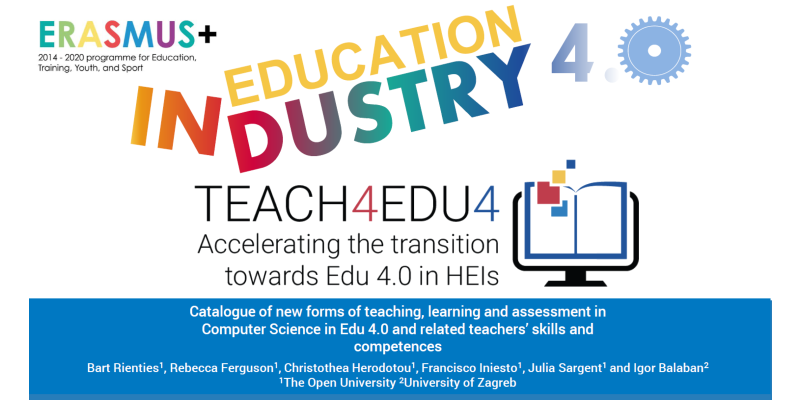As part of the CALRG conference , Prof. Bart Rienties, PhD. from OU UK presented on June 15th 2021 the work created with TEACH4EDU4 project team: Rebecca Ferguson, Christothea Herodotou, Francisco Iniesto, Julia Sargent and Igor Balaban “Catalogue of new forms of teaching, learning and assessment in Computer Science in Edu 4.0 and related teachers’ skills and competences“, which is direcly connected with the results (IO1) of the TEACH4EDU4 project. Recording of the video can be found here and the presentation is available here.
Short description:
The overall aim of Teach4EDU is to enable the creation of an environment that supports implementation of new Education 4.0 learning and teaching approaches in Computer Science (CS). A systematic literature review was carried out, focusing on three research questions. RQ1: Which pedagogic approaches are used to support the teaching of CS?; RQ2: Which of these approaches align with Education 4.0?; RQ3: What skills and competences do HE educators require in order to align CS with Education 4.0? Our literature search identified 66 articles. Perhaps surprisingly none of the articles explicitly mentions “Education 4.0”. The most common Education 4.0 characteristic was “5) students will be exposed to more hands-on learning through field experience” (73%), followed by “9) students will become more independent in their own learning” (67%), “4) students will be exposed to more project-based learning” (61%). A cluster analysis indicated a three-cluster solution: 1) EDU 4.0 light (n = 18), 2) project-based/hands-on learning (n = 22), and 3) full EDU 4.0 (n = 26). In EDU 4.0 light studies teachers mostly focussed on more independent learning (61%), learning anytime anywhere (44%), and personalised learning (39%).
The second cluster had a strong focus on project-based (86%) and hands-on learning (86%), with relatively limited focus on choice how to learn (5%), personalised learning (5%), and learning anytime anywhere (18%).
The third and finalcluster, full EDU 4.0, was strongly focussed on hands-on learning (100%), becoming more independent (96%), personalised learning (85%), learning anytime anywhere (77%) and choice how to learn (77%). Overall, while there are some engaging and diverse practices in CS and Education 4.0 in Europe, it seems that relative to other countries (e.g., USA) more work needs to be done. This is one of the aims of the TEACH4EDU project will address.
